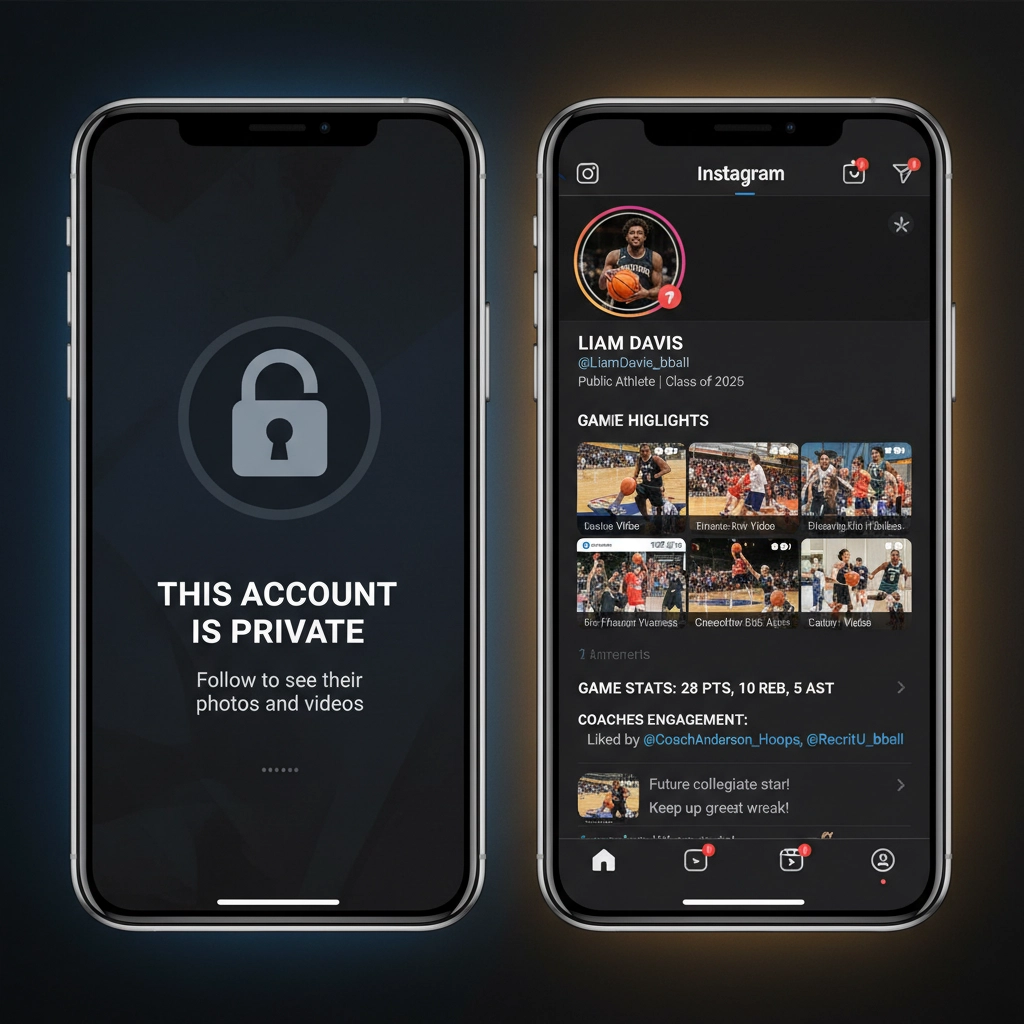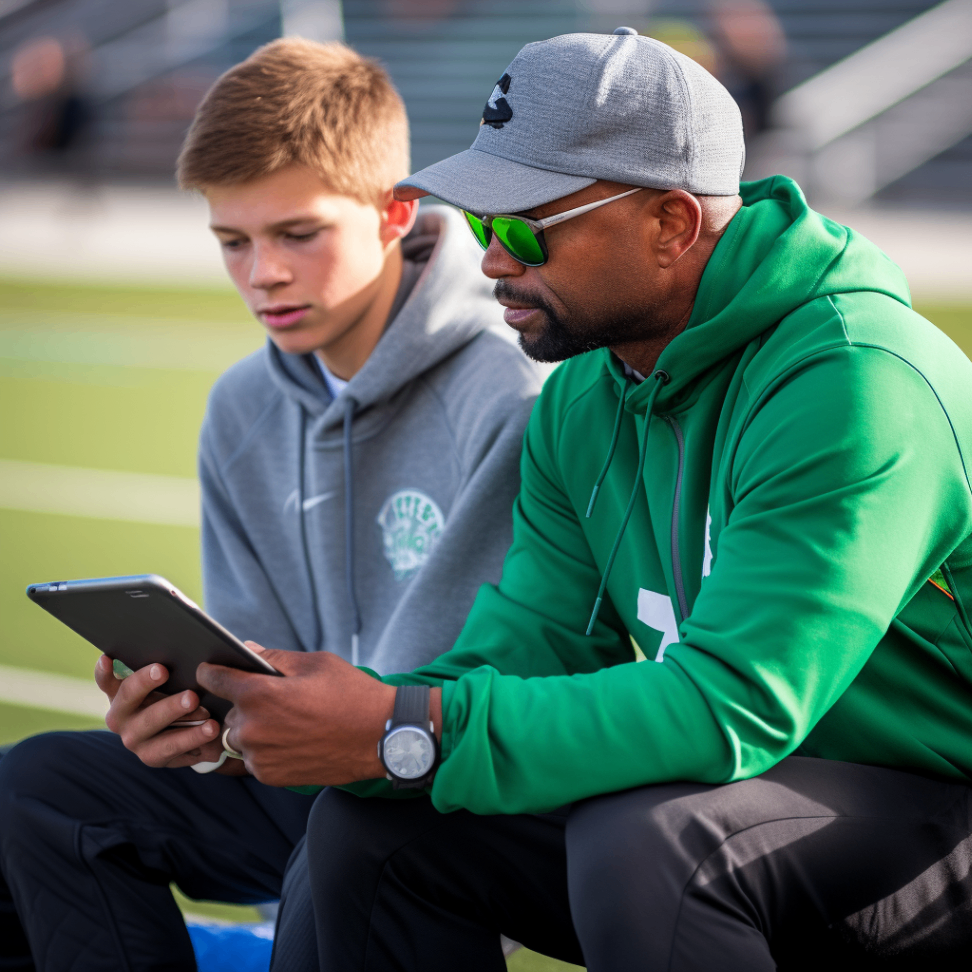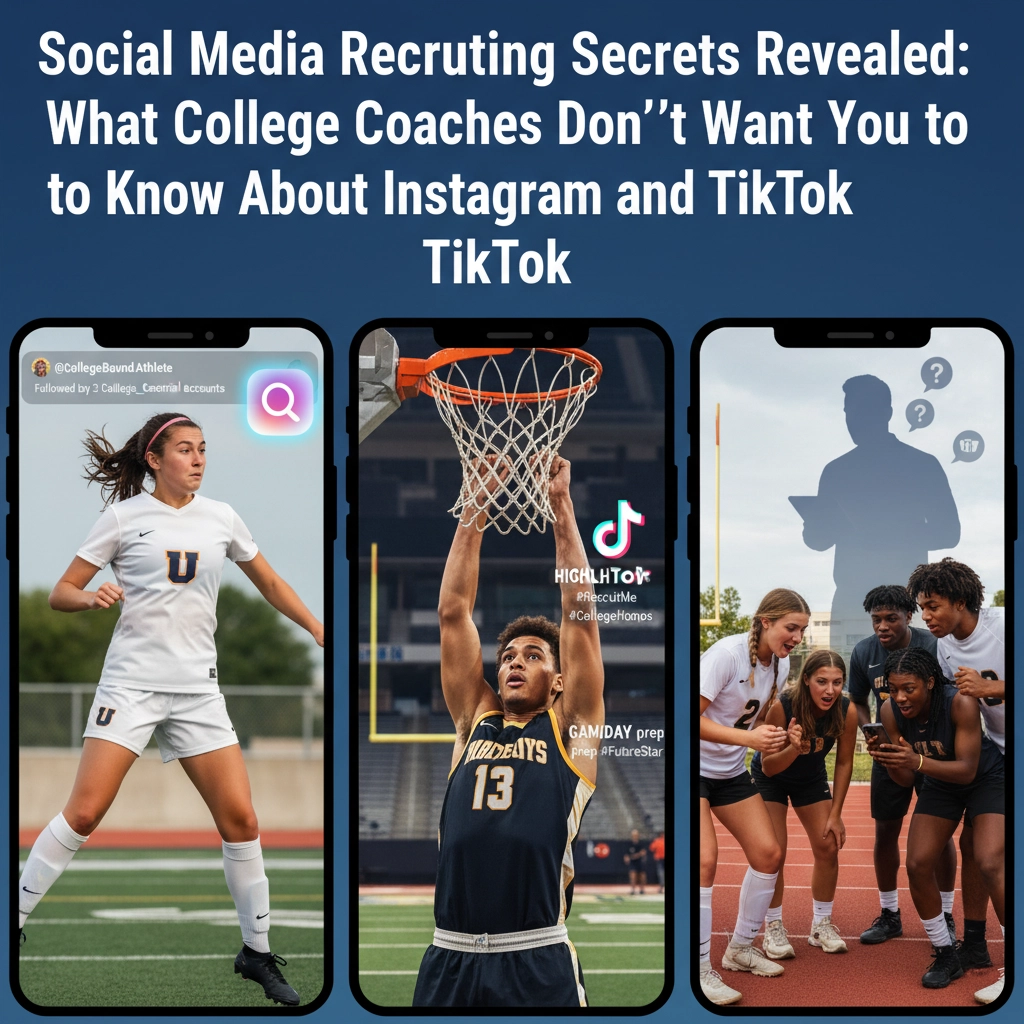The "secrets" aren't really secrets at all: they're strategic insights that most athletes completely miss or misunderstand.
Here's what's actually happening behind the scenes, and how you can use social media recruiting to your advantage.
The Private Account Trap That's Killing Your Chances
Your private Instagram account isn't protecting you: it's sabotaging your recruiting prospects. When college coaches encounter a private profile, they immediately wonder what you're hiding. Private accounts raise red flags and often turn coaches off before they even consider you as a potential recruit.
The harsh reality? Privacy on social media is mostly an illusion. Anyone who follows you can screenshot your content, and word travels fast in the tight-knit world of college athletics. Instead of hiding behind privacy settings, take control of your narrative.
What to do instead:
Conduct a complete audit of all your posts
Delete anything you wouldn't want your future coach to see
Make your accounts public and use them strategically
Think of every post as a potential recruiting tool

Platform Priorities: Where Coaches Actually Spend Their Time
Not all social media platforms carry equal weight in the recruiting world. While TikTok dominates youth culture and Instagram feels like the center of everything, coaches have clear preferences based on functionality and their existing workflows.
Instagram and X (formerly Twitter) remain the most popular networks for college coaches. These platforms allow coaches to market their programs, showcase their athletes, and efficiently evaluate potential recruits. A massive 98% of US universities maintain active Facebook pages, while 84% use Twitter for recruiting purposes.
TikTok presents a different story. Despite having over a billion users worldwide, coaches haven't fully embraced TikTok as a primary recruiting tool yet. They're paying attention and learning the platform, but it remains secondary to Instagram and X for serious recruiting purposes.
What Coaches Really Care About (Hint: It's Not Your Follower Count)
Here's where most athletes get it completely wrong: college coaches don't care about your follower count or how many likes your posts get. Social media serves as a supplementary evaluation tool, not the main event.
Coaches use social media to assess:
Your character and decision-making
How you handle both wins and losses
Your interactions with teammates and competitors
Your professionalism and maturity
Whether you'd represent their program well
You cannot rely strictly on social media for recruiting exposure. Coaches need legitimate channels like game film, stats, and direct communication to properly evaluate your abilities.

The NCAA "Tap, Don't Type" Rule You Need to Know
Understanding NCAA regulations is crucial for effective social media recruiting. Coaches can follow you and like or share your content on all platforms, including TikTok, but they cannot comment on your posts until you're committed to their program.
This "tap, don't type" rule applies across all social media platforms during the recruiting process. However, you can and should tag college coaches and programs on both Instagram and TikTok. This visibility helps coaches discover your content while staying within NCAA compliance guidelines.
Key NCAA social media rules:
Coaches can like and share your content
Coaches cannot comment until you commit
You can tag coaches and programs
Direct messaging follows different rules based on your classification
Creating TikTok Content That Actually Helps Your Recruiting
TikTok requires a different approach than traditional recruiting platforms. The key is balancing authenticity with professionalism while showcasing your athletic journey.
Effective TikTok content for recruiting includes:
Training clips showing your work ethic
Behind-the-scenes footage from games and practices
Game highlights set to trending audio
Video diaries discussing your passion for your sport
Day-in-the-life content showing your routine
Reaction videos to big wins or tough losses
While it's acceptable to be light-hearted and participate in trends, maintain the same professional standards you would on other platforms. Coaches are watching, even if they're not actively commenting or engaging.
Instagram Strategy: Your Digital Business Card
Instagram serves as your digital business card in the recruiting world. Your profile should immediately communicate who you are, what sport you play, and why coaches should be interested.
Optimize your Instagram profile with:
Full name in your username or bio
Graduation year prominently displayed
Position and team information
Clear sports photo as your profile picture
Link to your recruiting profile or highlight reel
Contact information for easy communication
Your feed should showcase a mix of athletic content, academic achievements, and character moments. Show your personality while keeping everything authentic and positive.

Direct Communication That Actually Gets Responses
When reaching out to coaches via social media, generic messages fail every time. Cookie-cutter DMs scream mass communication, and coaches can spot them immediately.
Make every message specific to each school:
Reference recent team successes or achievements
Mention specific coaching philosophies that resonate with you
Discuss how you'd fit into their system or culture
Highlight a recent accomplishment that showcases relevant skills
Address coaches by name and title
Keep initial messages concise but specific. Express genuine admiration for the program while demonstrating that you've done your homework about their team, coaching staff, and recent performance.
Content That Destroys Your Recruiting Prospects
Some content can instantly eliminate you from recruiting consideration, regardless of your athletic ability. College coaches have withdrawn offers from student-athletes who used profanity on social media, including slang terms that might seem harmless to your peer group.
Avoid posting content that includes:
Any form of profanity or inappropriate language
Negative comments about teammates, coaches, or opponents
Party photos or references to substances
Controversial political statements or divisive content
Anything that sounds narcissistic or self-aggrandizing
Instead, post content showcasing gratitude toward teammates, coaches, family, and supporters. This demonstrates the character traits coaches value: teamwork, humility, and leadership.
Building Your Complete Social Media Recruiting Strategy
Your social media presence should function as a dedicated showcase of your athletic and academic achievements rather than your social life. This doesn't mean being boring: it means being strategic about what you share and how you share it.
Create a comprehensive approach by:
Regularly updating profiles with athletic achievements
Sharing training regimen details and workout insights
Documenting participation in camps, showcases, and competitions
Highlighting academic successes and community involvement
Engaging meaningfully with coaches, programs, and other athletes
Maintaining consistency across all platforms
Remember that your online presence creates lasting impressions that either enhance or undermine your recruiting opportunities. Authenticity, professionalism, and strategic engagement are essential for long-term success.
The Real Social Media Recruiting Secret
The biggest "secret" about social media recruiting isn't hidden at all: it's that your online presence should authentically represent the best version of yourself. Coaches aren't looking for perfect robots; they want genuine student-athletes who will positively represent their programs.
Social media serves as one component of a comprehensive recruiting strategy, not a magic solution. Your posts, interactions, and digital presence should support and enhance your athletic achievements, not replace the fundamental work of skill development, academic performance, and direct coach communication.
The athletes who succeed in social media recruiting understand that every post is an opportunity to showcase their character, work ethic, and potential contribution to a college program. They use platforms strategically while remaining authentic to who they are as people and competitors.
Your social media accounts are powerful recruiting tools when used correctly. Make sure they're working for you, not against you, as you pursue your college athletic dreams.


